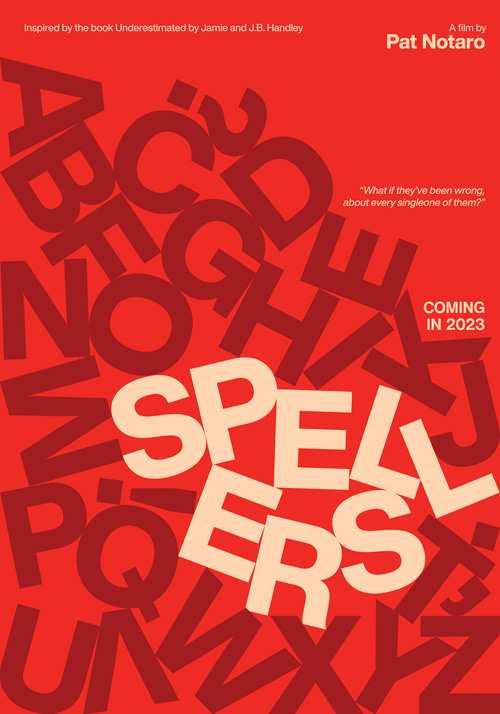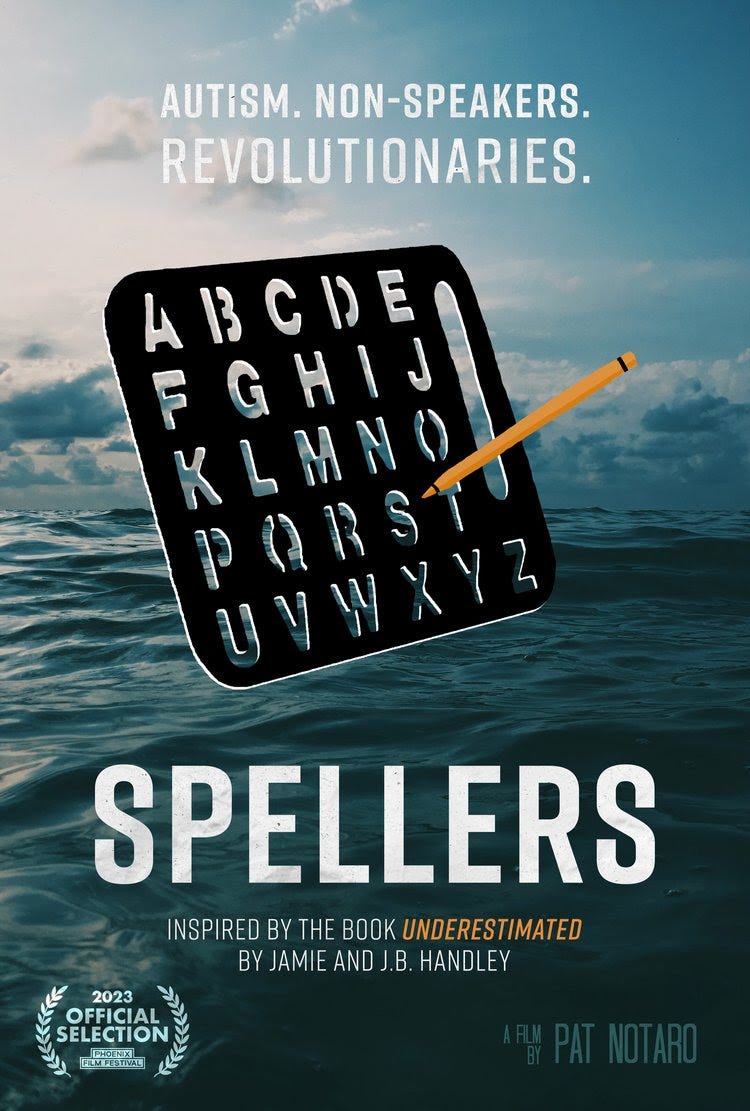"SPELLERS": A Documentary That is Going to Change the World
I’m warning you beforehand: SPELLERS is going to kick your ass. Let it. And then join the parents who know it is every child's right to communicate, but we have been holding them in a mental cage.
Imagine being unable to speak, wanting to speak, with everyone treating you like an infant. For your entire life.
You’re not able to ask for things you like, or let your loved ones know you're in pain. You cannot report any wrongdoings that are done to you. You can’t express your feelings.
How would you feel?
Frustrated? Lonely? Isolated? Abandoned? Trapped?
Now what if all it took was training and a little technology - tech used every day by people like you and me - to set your voice free - but the mainstream media, the public education juggernaut, and those tasked with the standards of care for children with developmental disorders ignored or actively denied it? (ASHA, the American Speech-Language Hearing Association, is criticized multiple times in the movie for their stifling and stupefying dismissal of this form of communication.) (LINK: https://www.asha.org/)
Aydan, Jamie, Evan, Trey, Cade, Madison, Sid, Vince, Elizabeth, Elliot, Sam, GJ, Charles and Liam are 14 brilliant, caring compassionate young minds who, in the documentary SPELLERS, provide testimony to the fact that they are going to change your views, and the world’s views on autism - forever.
A few days ago, JB Handley invited me to preview and review a forthcoming documentary. The film “SPELLERS”, is about the life-changing experiences being had by non-verbal kids with autism and their families.
“After your watch “SPELLERS”, you will never look at any “autistic” child - or any adult - who is non-verbal the same way again.
Years ago, I had heard about a technique parents were trying where the would hold their kids’ hands and the kids would point to symbols and in this way the parents would report what their child was saying. The approach had been dismissed, with critics claiming that the parents, not the children, were doing the choosing. The parents, they said, so desperate to have a relationship with their child they entered into some form of delusion.
I’m no film critic, and I had a leg up on those who have never heard of the film. JB and I have a pretty trusting relationship. I had interviewed JB and his son, Jamie, a year ago, on my podcast. There was a specific moment in that podcast when I knew that Jamie was truly answering my questions: his previously wandering eyes focused like a laser on the keyboard, then the screen, and back and forth as he went to make sure he was not making errors in his message. That’s when it hit home for me. I felt honored to be perhaps the very first podcast host to interview a previously non-communicative non-speaking person.
I’m warning you beforehand: SPELLERS is going to kick your ass.
“SPELLERS” is Not For the Faint of Heart
Evening knowing what I knew from speaking w/JB and other parents involved in the care of their young adult children, I did not expect to go through the emotional ride that SPELLERS mandates of you. I literally had to take it in small doses - 20 minute at at time, to let myself process what I had just seen on the screen. Not out of disbelief - but rather out of my keen sensitivity to injustices and my penchant to fight for the downtrodden.
SPELLERS has some important societal lessons for all of us. The lessons are not there for the expediency of political correctness. They are there because if we continue to treat kids with autism with the presumption of intellectual disability we are denying them the opportunity to engage in their own learning experiences, in their own enrichment, in their own lives. We condemn them to social isolation, which, even without stigma, becomes a one-way street. We condemn them to dependence. We condemn them to being underestimated. We deny them the chance to express unhappiness, joy, and the chance to say “I Love You”.
These lessons are not difficult, but they are profound. And SPELLERS teaches these lessons IN THEIR OWN WORDS.
Presume intellectual aptitude. Cade Larson said is quite well: “I think knowing we are intelligent and treating us with respect helps.”
It all starts with knowing that a non-verbal child will, with the right training, be able to provide their own thoughts. And they will be complex, far more developed that you could ever expect.
Give them the respect they deserve.
Every autonomous, sentient mind deserves the space to have their own viewpoints heard and understood. With the presumption of intellect comes a mandate for respect.
Expect revealing, profound prior knowledge and synthesis
The film provides numerous examples of beautifully deep profound original thought that otherwise would not ever have been expressed. Naturally, once their minds are freed from their cages, they share their original thoughts.
Expect that your child is going to grateful, loving and compassionate
Each person who has come through the training wants, more than anything else, to encourage other non-verbals to get trained and set their minds free. “It will be worth it!”
The Right to Communicate is Fundamental - and Right Now, in 2023, Millions of Children Are Denied.
In my view, this is the most important part of the film. It all boils down to Civil Rights, and this powerful point is not rhetorical:
Title II of the Americans with Disabilities Act of 1990 (ADA) prohibits discrimination based on disability by public entities and in State and local government services, programs, activities and employment, regardless of whether they receive federal financial assistance. (www2.ed.gov)
The Civil Rights Center (CRC) is responsible for enforcing Title II of the ADA as it applies to the labor- and workforce-related practices of state and local governments and other public entities. (www.dol.gov)
Title 2 of the American Disabilities Act guarantees each child the right to have access to technology as needed to communicate during schooling in their preferred manner via reasonable accommodations: A public entity must reasonably modify its policies, practices, or procedures if needed to make the public entity's programs, services, or activities accessible for a person with a disability. (disabilityrightsnc.org) and 28 C.F.R. § 35.130(b)(7).
How to watch it
SPELLERS has been accepted into Phoenix Film Festival 2023! The film will screen three times, during March 31st to April 2nd. If you can join the filmmakers in Phoenix, they want to see you there! You can find more information about the festival at phoenixfilmfestival.com.
I’ve also heard rumors that they might hold a private online screening of the film on April 2, World Autism Awareness Day. J.B. wouldn’t confirm this, but he did say it’s critical people who want to be kept in the loop (invited) share their email here. (LINK: https://spellersthemovie.com/connect) SPELLERS also has a pretty active Instagram page where you can keep up to date. (LINK: https://www.instagram.com/spellersthemovie/?hl=en).
J.B. definitely confirmed that by the summer the film will be “available worldwide” and that he hopes families will pull their communities together to watch. It couldn’t happen soon enough. He said it’s particularly important for nonspeakers to see what their peers are capable of. (Wait unitl they meet Elizabeth, the film’s finale character and a valedictorian from Rollins College.)
SPELLERS website ponders, “What if everything you knew about autism was wrong?” The movie affirms that’s true, even for me.
The film is scheduled to be released. I am asking everyone to plan a screening. Bring fmilies together. To join the SPELLERS mailing list, click on the film cover art below.
From the Filmmakers:
Hello there!
We are pleased to introduce SPELLERS, the new full-length documentary which challenges conventional wisdom regarding a group relegated to society’s margins: nonspeakers with autism. Inspired by the book Underestimated, the film tells the stories of eight nonspeakers who all found their voice through the process of using a letterboard to communicate their thoughts and feelings. As Jamie explains, “we think, feel, and learn just like everyone else.”
You can find our full-length trailer here!
We are also excited to announce that SPELLERS has been accepted into Phoenix Film Festival 2023! The film will screen three times, during March 31st to April 2nd. If you can join us in Phoenix, we hope to see you there! You can find more information about the festival at phoenixfilmfestival.com. We will provide further information on showtimes when it’s available.
Follow us @spellersthemovie on YouTube, Instagram, Facebook, and TikTok to stay connected.
Keep an eye out for more news about SPELLERS coming soon.
Sincerely, The SPELLERS Team
4055 Oceanside Blvd Ste B, Oceanside, CA, 92056, USA






I read the book “Underestimated” upon which the documentary is based. It was incredible and uplifting. But when I described it by text to a friend who had a non-verbal, severely autistic adult brother, she literally ghosted me on that text even though she’s since responded to many others. I have no idea why she was triggered by the great news that there’s hope for people like her brother, but her chilly response is reminiscent of how some people react when you show them proof of vaccine failure, etc. They’re just so conditioned to their way of thinking that there’s no way to break through.
Fyi, I’m a huge fan of the Handley family. JB Handley’s book, “How to End the Autism Epidemic” was one of my first exposures to the side effects of the childhood vaccine schedule, and to some of the villains who are currently grabbing power like Peter Hotez.
some years before he died, my father- who was sharp as a tack until his death- got a case of sepsis. i was at work and my BF called the ambulance. the idiot EMTs determined that he wasn't having a stroke and wouldn't take him. on the phone, i screamed "but he's not making any sense!" and the guy said "he's old; it happens."
"he was old yesterday and he was making sense! you take my father to the hospital!" i ordered, with a good deal of added swearing.
they took him, my BF followed in the car and i left work and caught a train to the hospital. the ER doc asked him one word questions like "who's the president?" and "how old are you?" which dad answered. the doctor was satisfied. "no, ask him a question that requires making a sentence" i insisted. the doctor gave it another go and out came a random sequence of unrelated words "fish mud hanger." stuff like that.
his temperature was not that high but an EMT worker spending her day off in the ER went a step further and took a rectal temperature. she sounded the alarm, getting him on antibiotics before any lab work was done. she just had a "feeling" that something was not right.
the next night we visited him and he was back to his bright, articulate, charming self. "last night was terrible" he said "i couldn't make myself understood. i kept talking but the words were all coming out wrong. today i can say what i mean."
a horrible thought seized me: what if the people we think have autism or alzheimers are really in there, aware of everything that is going on around them but their words get lost and scrambled somewhere between their brain and their mouth? you could be sitting in a nursing home, saying out loud "i don't know why i bother to visit grandma. she's not even aware that i'm here" and she's saying in her head "no, i am aware. i love you. i hate this place. please take me home!" except that it all comes out as gibberish.
imagine the torture, being a person walled off from everything.